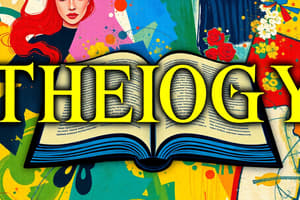Podcast
Questions and Answers
What are the two primary sources of revelation in theology?
What are the two primary sources of revelation in theology?
Sacred Scripture and Sacred Tradition.
In what sense does Christianity unite the Old and New Testaments?
In what sense does Christianity unite the Old and New Testaments?
The Old Testament prepares for and anticipates the New Testament, which fulfills its promises through Jesus Christ.
How does the role of God and human authors differ in the context of Sacred Scripture?
How does the role of God and human authors differ in the context of Sacred Scripture?
God is the ultimate author who inspires, while human authors write the texts through their unique styles and contexts.
Why is the concept of being called into a relationship with God significant in Christianity?
Why is the concept of being called into a relationship with God significant in Christianity?
What does Benedict XVI's view on Eros and Agape suggest about the relationship between love and sexuality in Christianity?
What does Benedict XVI's view on Eros and Agape suggest about the relationship between love and sexuality in Christianity?
The goal of theology is ______ seeking understanding.
The goal of theology is ______ seeking understanding.
The Greek word 'ekklesia' means 'called ______'.
The Greek word 'ekklesia' means 'called ______'.
Christianity is primarily about a relationship with ______.
Christianity is primarily about a relationship with ______.
According to Nietzsche, Christianity poisoned ______.
According to Nietzsche, Christianity poisoned ______.
When Eros is informed by Agape, it seeks happiness for an ______.
When Eros is informed by Agape, it seeks happiness for an ______.
Flashcards are hidden until you start studying
Study Notes
Theology
- Theology aims to understand faith.
- Theology differs from religious studies by focusing on understanding faith from within a particular religious tradition, while religious studies examines religion objectively.
Revelation
- Revelation is the way God reveals himself to humanity.
- The two sources of revelation are Sacred Scripture and Sacred Tradition.
- The Church is responsible for ensuring that revelation is transmitted faithfully and without error.
Sacred Scripture
- God is the ultimate author of Sacred Scripture.
- Human authors were inspired by God to write Scripture.
- The literal sense of Scripture refers to the meaning conveyed by the words themselves.
- The spiritual sense of Scripture refers to the deeper meaning that can be discerned by considering the text in light of its relationship to Christ.
- The allegorical sense of Scripture refers to the hidden symbolic meaning of the text.
- The moral sense of Scripture refers to the practical implications of the text for living a Christian life.
- The anagogical sense of Scripture refers to the ultimate meaning of the text in relation to the eternal destiny of humanity.
- The Old Testament foreshadows the New Testament, while the New Testament fulfills the Old Testament.
- The four Gospels (Matthew, Mark, Luke, and John) describe the earthly life of Jesus.
Christianity as an Encounter with a Person - Jesus Christ
- Christianity is fundamentally about a relationship with God, specifically with Jesus Christ.
- Conversion to Christianity is not forced but is a response to a call from God.
- The word “ekklesia” (Church) means “called from” in Greek.
- Christians are called from the world into a relationship with God based on love.
- God must be knowable for a relationship with God to be possible.
Christianity and Eros
- Nietzsche believed that Christianity poisoned Eros (love) by turning sexuality into a taboo.
- Benedict XVI argued that Christianity heals Eros by infusing it with Agape (selfless love).
- Agape without a connection to the flesh can lead to stoicism or Gnosticism.
- Uninformed Eros seeks selfish pleasure and happiness.
- Informed Eros seeks the happiness of the beloved, shifting the focus from self to others.
Theology
- The goal of theology is to understand faith.
- Theology attempts to understand faith, while religion focuses on faith practices and religious studies analyze religion as a phenomenon.
Revelation
- Revelation is the process by which God reveals himself to humanity.
- The two sources of revelation are Scripture and Tradition.
- The Church is responsible for ensuring the faithful and accurate transmission of revelation.
Sacred Scripture
- God is the ultimate author of Sacred Scripture.
- Human authors played a crucial role in writing Scripture under God's inspiration.
- Literal Sense: The straightforward meaning of the text.
- Spiritual Sense:
- Allegorical: The text points to a deeper spiritual meaning.
- Moral/Tropological: The text offers guidance for living a virtuous life.
- Anagogical: The text points toward the ultimate end goal of Christian life, heaven.
- The Old Testament serves as preparation for the New Testament.
- The Gospels describe the life of Jesus Christ on Earth.
Christianity as an Encounter with Jesus Christ
- The essence of Christianity is a personal relationship with God through Jesus Christ.
- Conversion is a personal decision based on faith and cannot be forced.
- The word "ekklesia" means "called from" or "called out of" in Greek, implying a calling from the world into a deeper connection with God founded on love.
Christianity and Eros
- Nietzsche believed Christianity undermined human sexuality, turning it into a taboo.
- Pope Benedict XVI argued that Christianity heals Eros, meaning it elevates sexuality to a higher level.
- According to Benedict XVI, Eros, when informed by Agape (divine love), transforms from a focus on self-gratification into a love directed towards another.
- Eros without Agape can lead to stoicism or Gnosticism.
- Agape without Eros can become detached from the body and lead to a lack of concern for the physical world.
Studying That Suits You
Use AI to generate personalized quizzes and flashcards to suit your learning preferences.




